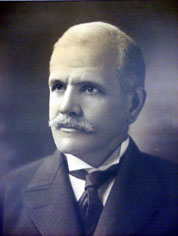Holmes Conrad
| Holmes Conrad | |
|---|---|

Holmes Conrad portrait
|
|
| Born | Winchester, Virginia |
| Website | http://web.archive.org/web/20081009072131/http://www.usdoj.gov/osg/aboutosg/holmescbio.htm |
Holmes Conrad (January 31, 1840 – September 4, 1915) was an American politician, lawyer and military officer.
Conrad was born in Winchester, Virginia. He was the son of Robert Young Conrad, a prominent lawyer of Winchester, and state attorney general from 1857 to 1862; his mother was Elizabeth Whiting, daughter of Burr Powell. After attending the Virginia Military Institute, Conrad proceeded in 1858 to the University of Virginia.
At the outbreak of the Civil War he enlisted as a private in Company A, 1st Virginia Cavalry and saw active service throughout the war. He was commissioned a lieutenant and was appointed adjutant in August 1862. In 1864 he became major and assistant inspector general of Thomas Rosser’s cavalry division, serving there until the end of the war.
In 1865 Conrad commenced the study of law in his father’s office in Winchester, and on his admission to the Virginia bar in January 1866, joined his father’s practice. In 1878, he was elected to the Virginia legislature, serving until 1882. Over the next few years, he became one of the leaders of the Virginia bar and acquired an influential position in the councils of the Democratic Party. In 1890, Conrad was a charter member of The Virginia Bar Association. In 1893 President Grover Cleveland appointed him Assistant Attorney General of the U.S., and in 1895 he became Solicitor General.
When he left the position of Solicitor General in 1897, Conrad was retained by President William McKinley on behalf of the Federal government in Morris v. U.S. In October 1901 he joined the law faculty of Georgetown University as lecturer on the history of English law. In 1904 Conrad was again retained on behalf of the Federal government as a special prosecutor in the Postal Fraud Cases. During the last 20 years of his life he was constantly engaged in appeals before the Supreme Court of the United States, where his outstanding ability had wide scope.
...
Wikipedia
